Topics
Category
Era
Marine Mill, Marine on St. Croix
Marine Mill, the first commercial sawmill in Minnesota, operated in Marine Mills (Marine on St. Croix) along the banks of the St. Croix River from 1839 to 1895. Over a period of about six decades, the mill produced millions of board feet of lumber and provided construction material used in towns and cities throughout the state. The remaining ruins were placed on the National Register of Historic Places in 1970 and opened to the public as a park and historic site two years later. The Marine on St. Croix Historic District, created in 1974, includes the mill’s remains.
Marine Mill was constructed by David Hone and Lewis Judd, two lumbermen from Marine, Illinois, who came to the St. Croix Valley in 1838 to find a suitable lumbering site. They chose to settle in the area for its proximity to fast-growing white pine trees in the northern St. Croix watershed. Hone and Judd built a small sawmill with a flutter wheel and founded the Marine Lumber Company on August 24, 1839. Over the next three decades, the mill’s lumber production grew enormously. During the winter of 1839–1840, it produced roughly 5,000 board feet of lumber. By 1877, it was producing two million board feet of lumber, 500,000 shingles, and 200,000 laths annually. A large steamboat levee spanned the length of the site. About fourteen men worked at the mill on a daily basis, and a 40-by-28-foot log boarding house on the site housed them.
The company demolished the original wood frame sawmill in 1852 and replaced it with a new one that had a forty-foot overshot wheel with a muley saw. It succumbed to fire in 1863. That year, tanner, Vermont native, and early Marine Lumber Company partner Orange Walker became the sole proprietor of the company. In 1868, with Lewis Judd and newcomer William Veazie, Walker formed a new company known as Walker, Judd & Veazie, and a new mill was constructed that year.
In the 1870s, the company expanded and was in its heyday, with income reaching $400,000 by 1875. The steamboat landing pier and log boom were also expanded to accommodate increased production. In order to keep up with competitors, the mill was rebuilt yet again in 1873. The company eventually constructed a telephone line to Stillwater for ease of business. By the winter of 1880–1881, Marine Mill produced the highest lumber yield of its existence. At its production peak, the site comprised a 102-by-56-foot board-and-batten sawmill, a wood frame planing mill, a stream drying house, and storage sheds. Additionally, there were areas for stockpiling the large amounts of lumber, laths, shingles, and other products Walker, Judd & Veazie produced.
Major setbacks devastated the mill over the years, including increased competition, a national economic depression, tornado damage, log jams, and occasional low water levels that made lumber transport difficult. After Walker, Judd & Veazie went bankrupt in 1885, creditors operated the mill for a while, and the company was sold to Anderson and O’Brien Sawmill Company of Stillwater in 1888. Town residents attempted to keep the mill in operation, but it ceased operations in 1895 after years of inactivity. Another company purchased the mill that year and sold the machinery to other lumbering firms. The various frame buildings were demolished thereafter.
After the mill closed, the town’s name was changed from Marine Mills to Marine on St. Croix to reflect the absence of the milling industry. In over a half-century of operation, Marine Mill produced 197,000,000 board feet of lumber. The mill produced lumber used for construction in many towns and cities throughout the state in the late nineteenth century.
The Marine Mill site was listed on the National Register of Historic Places in 1970. The Minnesota Historical Society acquired it in 1972. Soon afterward, the site became a park managed by the City of Marine on St Croix with three distinct areas: an upper bluff, rocky cliffs, and a river-level floodplain. The site featured the mill’s ruins, including remnants of the sandstone sawmill and its overshot wheel, along with the planing mill and drying shed foundations. It also contained a stream, walking trails, interpretive signs, a beach, a canoe landing, and an observation deck.
Bibliography
“A Big Marine Saw Mill to Begin Running at Full Capacity at Once.” St. Paul Globe, September 27, 1890.
Hackett, John J. “Marine on Saint Croix Historic District.” National Register of Historic Places nomination file, April 8, 1974. State Historic Preservation Office, St. Paul.
https://npgallery.nps.gov/NRHP/GetAsset/NRHP/74001043_text
“Historic Walking Tour of Marine on St. Croix.” City of Marine on St. Croix.
https://www.marineonstcroix.org/vertical/sites/%7BE6A156D5-6FCB-4DD8-BA60-2F231F862CF9%7D/uploads/MARINE-HistoricWalkingTour.pdf
Johnson, Steve, and Kenneth Belanger. Minnesota Waterfalls. Madison, WI: Trails Books, 2007.
“Learn.” Minnesota Historical Society.
https://www.mnhs.org/marinemill/learn
“Marine Mill Site Historical Marker.” Historical Marker Database.
https://www.hmdb.org/m.asp?m=45392
“Marine on St. Croix.” Washington County Historical Society.
https://www.wchsmn.org/marine-on-st-croix
McGuire, Andy. “Marine Mill Park Forest Stewardship Plan.” City of Marine on St. Croix, 2018.
Morse-Kahn, Deborah. The Historic St. Croix Valley: A Guided Tour. St. Paul: Minnesota Historical Society Press, 2010.
Nord, Mary Ann, comp. The National Register of Historic Places in Minnesota: A Guide. St. Paul: Minnesota Historical Society Press, 2003.
“Plant of the Marine Lumber Company, at Marine Mills, Sold—Work on the St. Croix Boom.” Minneapolis Tribune, April 17, 1888.
Stanchfield, Daniel, and William Henry Carman Folsom. History of Lumbering in Minnesota. Pioneer Lumbering in the Upper Mississippi and Its Tributaries, with Biographic Sketches. Minneapolis: D. Stanchfield, 1900.
Warren, Jack K. “Marine Mill Site.” National Register of Historic Places nomination file, November 7, 1969. State Historic Preservation Office, St. Paul.
https://npgallery.nps.gov/NRHP/GetAsset/NRHP/70000311_text
Related Resources
Secondary
Dunn, James Taylor. The St. Croix: Midwest Border River. St. Paul: Minnesota Historical Society, 1979.
Larson, Agnes Mathilda. History of the White Pine Industry in Minnesota. Minneapolis: University of Minnesota Press, 1949.
McMahon, Eileen M., and Theodore J. Karamanski. North Woods River: The St. Croix River in Upper Midwest History. Madison, WI: University of Wisconsin Press, 2009.
Web
City of Marine on St. Croix. “Mill Site Committee.”
https://www.marineonstcroix.org/millsite
Marine Mills Folk School. “About Us.”
https://marinemillsfolkschool.org/about-us
Related Video
Preserving Marine Mill
More Information
Articles
Related Images
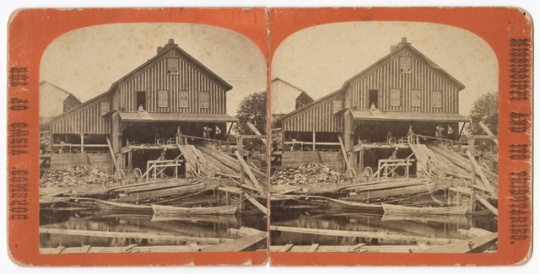
Walker, Judd & Veazie sawmill at Marine Mills, ca. 1880
Holding Location
Articles
More Information
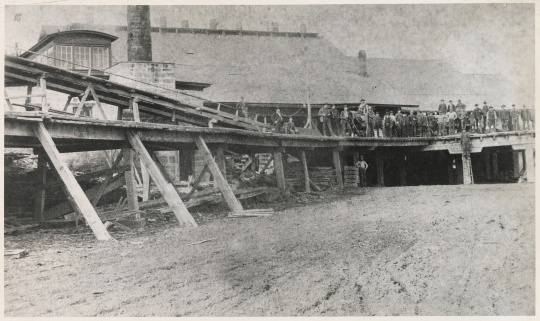
Walker, Judd & Veazie sawmill at Marine Mills, ca. 1880
Holding Location
Articles
More Information
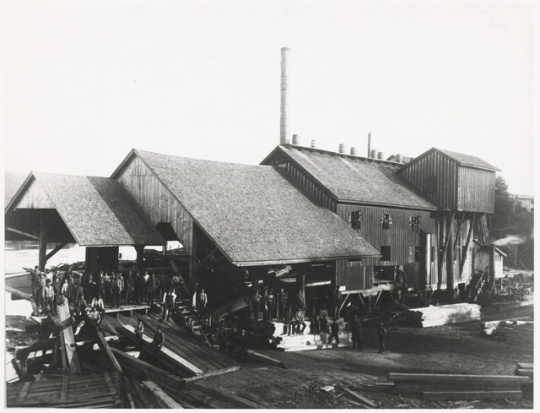
Walker, Judd & Veazie sawmill at Marine Mills, ca. 1882
Holding Location
Articles
More Information
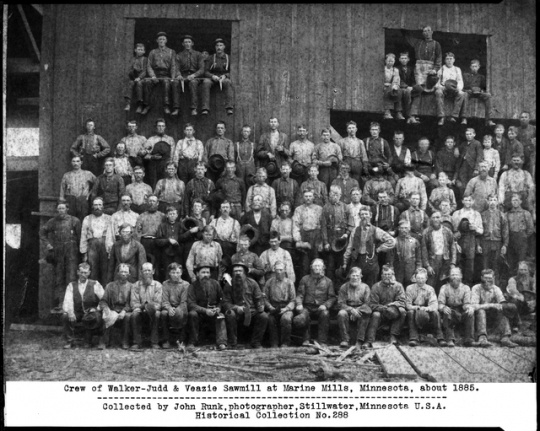
Sawmill crew at Marine Mills
Holding Location
Articles
More Information
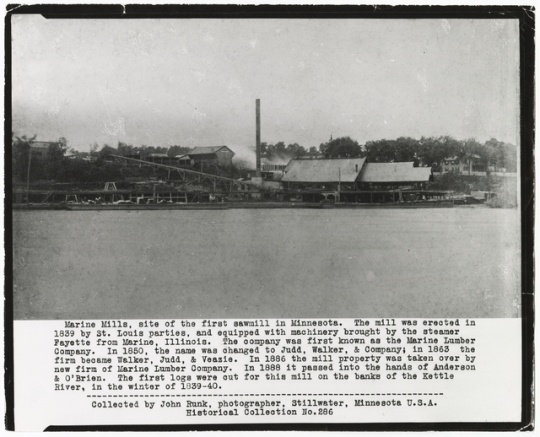
Walker, Judd & Veazie sawmill at Marine Mills, ca. 1890
Holding Location
Articles
More Information
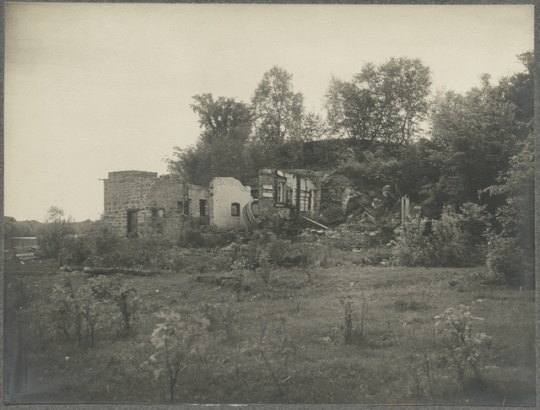
Marine Mill ruins, ca. 1900
Holding Location
Articles
More Information
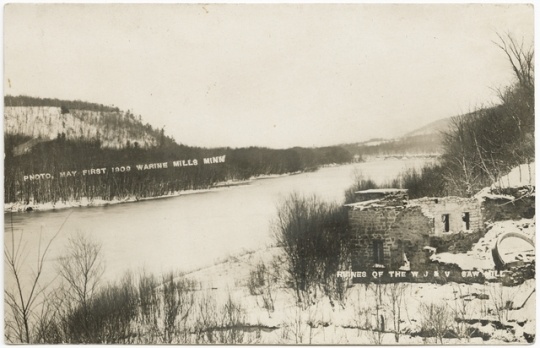
Marine Mill ruins, 1909
Holding Location
Articles
More Information
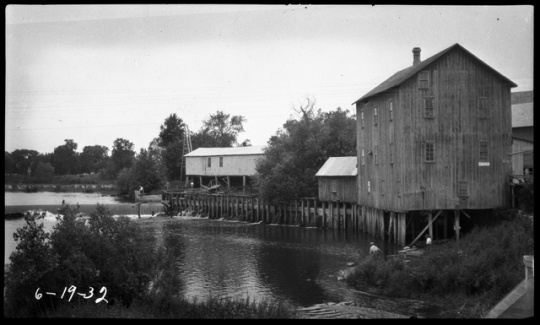
Marine on St. Croix, 1932
Holding Location
Articles
More Information
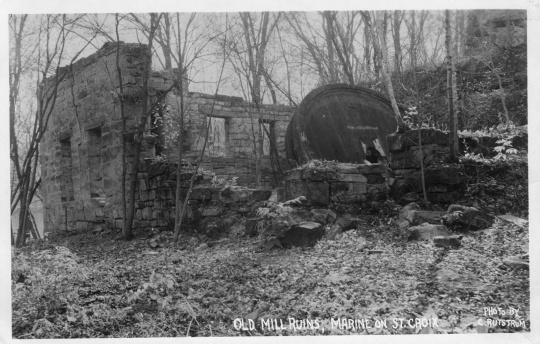
Marine Mill ruins, ca. 1940
Holding Location
Articles
More Information
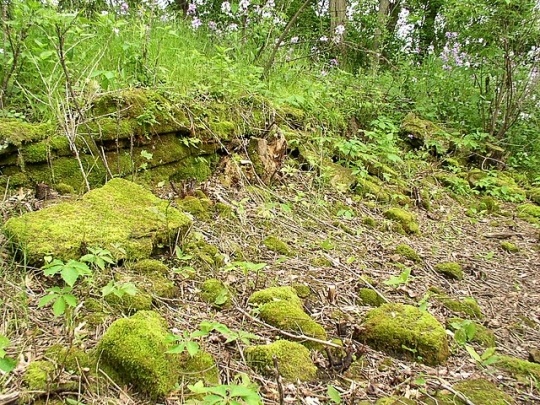
Marine Mill ruins, 2008
Holding Location
Articles
More Information
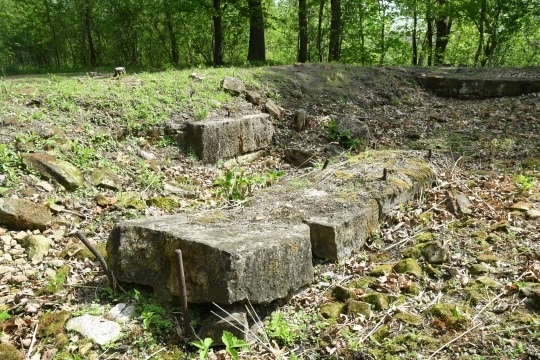
Marine Mill ruins, ca. 2010s
Holding Location
Articles
More Information
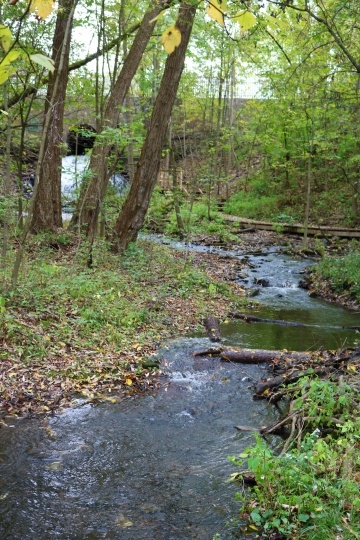
Waterfall and stream at Marine Mills historic site
Holding Location
Articles
More Information
Related Articles
Turning Point
By the winter of 1880–1881, Marine Mill produces the highest lumber yield of its existence.
Chronology
1838
1839
1840
1852
1863
1868
1873
1877
1880–1881
1885
1888
1895
1970
1974
Bibliography
“A Big Marine Saw Mill to Begin Running at Full Capacity at Once.” St. Paul Globe, September 27, 1890.
Hackett, John J. “Marine on Saint Croix Historic District.” National Register of Historic Places nomination file, April 8, 1974. State Historic Preservation Office, St. Paul.
https://npgallery.nps.gov/NRHP/GetAsset/NRHP/74001043_text
“Historic Walking Tour of Marine on St. Croix.” City of Marine on St. Croix.
https://www.marineonstcroix.org/vertical/sites/%7BE6A156D5-6FCB-4DD8-BA60-2F231F862CF9%7D/uploads/MARINE-HistoricWalkingTour.pdf
Johnson, Steve, and Kenneth Belanger. Minnesota Waterfalls. Madison, WI: Trails Books, 2007.
“Learn.” Minnesota Historical Society.
https://www.mnhs.org/marinemill/learn
“Marine Mill Site Historical Marker.” Historical Marker Database.
https://www.hmdb.org/m.asp?m=45392
“Marine on St. Croix.” Washington County Historical Society.
https://www.wchsmn.org/marine-on-st-croix
McGuire, Andy. “Marine Mill Park Forest Stewardship Plan.” City of Marine on St. Croix, 2018.
Morse-Kahn, Deborah. The Historic St. Croix Valley: A Guided Tour. St. Paul: Minnesota Historical Society Press, 2010.
Nord, Mary Ann, comp. The National Register of Historic Places in Minnesota: A Guide. St. Paul: Minnesota Historical Society Press, 2003.
“Plant of the Marine Lumber Company, at Marine Mills, Sold—Work on the St. Croix Boom.” Minneapolis Tribune, April 17, 1888.
Stanchfield, Daniel, and William Henry Carman Folsom. History of Lumbering in Minnesota. Pioneer Lumbering in the Upper Mississippi and Its Tributaries, with Biographic Sketches. Minneapolis: D. Stanchfield, 1900.
Warren, Jack K. “Marine Mill Site.” National Register of Historic Places nomination file, November 7, 1969. State Historic Preservation Office, St. Paul.
https://npgallery.nps.gov/NRHP/GetAsset/NRHP/70000311_text
Related Resources
Secondary
Dunn, James Taylor. The St. Croix: Midwest Border River. St. Paul: Minnesota Historical Society, 1979.
Larson, Agnes Mathilda. History of the White Pine Industry in Minnesota. Minneapolis: University of Minnesota Press, 1949.
McMahon, Eileen M., and Theodore J. Karamanski. North Woods River: The St. Croix River in Upper Midwest History. Madison, WI: University of Wisconsin Press, 2009.
Web
City of Marine on St. Croix. “Mill Site Committee.”
https://www.marineonstcroix.org/millsite
Marine Mills Folk School. “About Us.”
https://marinemillsfolkschool.org/about-us














